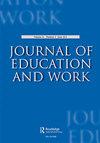The emergence of European boundary-spanning policy regimes: analysing intersectoral policy coordination in education and employment
IF 1.7
Q2 EDUCATION & EDUCATIONAL RESEARCH
引用次数: 1
Abstract
ABSTRACTWhile much attention has been paid to European policy arrangements in individual policy fields, European intersectoral policy coordination has been mostly an overlooked phenomenon, especially within the sectors of education and employment. Thus, in the introductory paper for this Special Issue, we offer a contemporary discussion of European intersectoral policy coordination. We firstly review the literature on intersectoral policy coordination, and secondly look at the application of concepts related to intersectoral policy coordination to supranational arrangements, especially the European Union. We then employ the concept of boundary-spanning policy regime and the related ‘I’ framework (issues, ideas, interests, and institutions) to discuss the individual pieces’ contributions. This serves to explore the strength of the intersectoral perspective when analysing European policy coordination in education and employment. We conclude with a discussion of the strengths and limitations of this approach and offer a research agenda to study supranational intersectoral policy coordination (in education and employment).KEYWORDS: Education and trainingEmploymentIntersectoral policy coordinationBoundary-spanning-policy regimesSupranational governance Disclosure statementNo potential conflict of interest was reported by the author(s).Notes1. In this context, whether or to what extent governance process are shaped by some actor groups more than others is an empirical question (see, for instance, the contribution by Cino Pagliarello on attempts by organised business to shape European educational and employment policies).2. ‘Issues’ have a long history in political science, especially in theories of the policy process such as the Multiple Streams Framework (Béland and Howlett Citation2016).Additional informationNotes on contributorsLukas GrafLukas Graf is professor at the Swiss Federal University for Vocational Education and Training and Head of the Swiss Observatory for Vocational Education and Training. He studies contemporary challenges related to skill formation and labour markets at global, European, national and local levels.Marcelo MarquesMarcelo Marques is a postdoctoral fellow at the University of Luxembourg. He is interested in comparative institutional and organisational analysis to understand transnational governance and Europeanisation processes.Tore Bernt SorensenTore Bernt Sorensen is postdoctoral researcher at the Hertie School. Tore’s work is characterised by three lines of research: Globalisation and education, public policy analysis, and teachers and teaching.Xavier DumayXavier Dumay is Professor of Education at UCLouvain, Belgium. His research interests include the globalization of education and educational policies, new-institutional theory, global politics, and changing forms of education.欧洲跨界政策制度的出现:分析教育和就业方面的部门间政策协调
摘要欧洲在个别政策领域的政策安排受到了很多关注,但欧洲部门间的政策协调往往被忽视,尤其是在教育和就业领域。因此,在本期特刊的导论中,我们对欧洲部门间政策协调进行了当代讨论。我们首先回顾了有关部门间政策协调的文献,其次考察了与部门间政策协调有关的概念在超国家安排中的应用,特别是欧盟。然后,我们采用跨界政策制度的概念和相关的“I”框架(问题、想法、利益和制度)来讨论各个部分的贡献。这有助于在分析欧洲在教育和就业方面的政策协调时探讨跨部门观点的力量。最后,我们讨论了这种方法的优点和局限性,并提供了一个研究超国家部门间政策协调(教育和就业)的研究议程。关键词:教育培训就业跨部门政策协调跨国界政策制度超国家治理披露声明作者未报告潜在的利益冲突。在这种背景下,治理过程是否或在多大程度上受到某些行为群体的影响,而不是其他行为群体的影响,是一个实证问题(例如,参见Cino Pagliarello对有组织企业试图塑造欧洲教育和就业政策的贡献)。“议题”在政治学中有着悠久的历史,特别是在政策过程的理论中,如“多流框架”(bsamland and Howlett Citation2016)。作者简介:卢卡斯·格拉夫,瑞士联邦职业教育与培训大学教授,瑞士职业教育与培训观察站主任。他在全球、欧洲、国家和地方各级研究与技能形成和劳动力市场相关的当代挑战。Marcelo Marques是卢森堡大学的博士后研究员。他对比较制度和组织分析感兴趣,以了解跨国治理和欧洲化过程。索尔·伯恩特·索伦森是赫蒂学院的博士后研究员。托尔的研究主要集中在三个方面:全球化与教育、公共政策分析、教师与教学。Xavier Dumay是比利时鲁汶大学的教育学教授。他的研究兴趣包括教育和教育政策的全球化、新制度理论、全球政治和教育形式的变化。
本文章由计算机程序翻译,如有差异,请以英文原文为准。
求助全文
约1分钟内获得全文
求助全文
来源期刊

Journal of Education and Work
EDUCATION & EDUCATIONAL RESEARCH-
CiteScore
2.70
自引率
14.30%
发文量
40
期刊介绍:
The Journal of Education and Work is an international forum for academic research and policy analysis which focuses on the interplay of the education and economic systems. The journal examines how knowledge, skills, values and attitudes both about and for work and employment are developed within the education system. The journal also explores the various forms of industrial training and accreditation in the economic system, including changes in the economic and industrial infrastructure which influence the type of employees required. Work in the informal economy is also included.
 求助内容:
求助内容: 应助结果提醒方式:
应助结果提醒方式:


